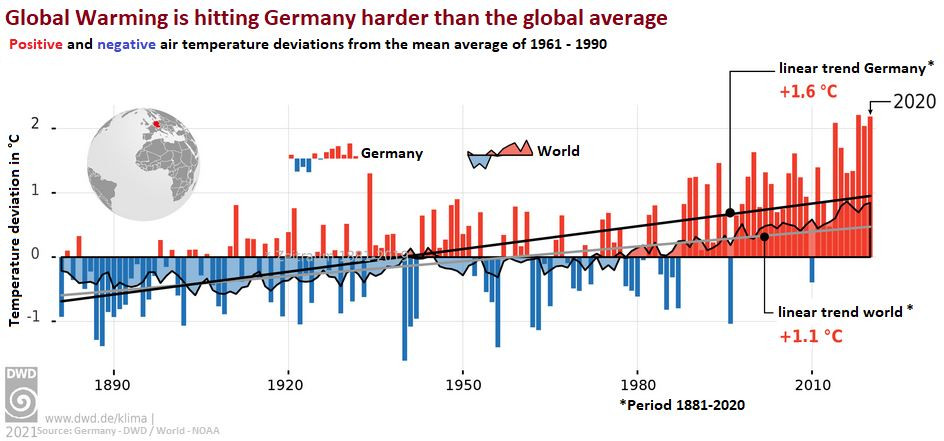World on course to exceed 2°C global warming by wide margin – German meteorological service
Clean Energy Wire
Current emissions reduction efforts around the world are insufficient to limit global warming to up to 2 degrees Celsius in line with the Paris Climate Agreement, Germany's Meteorological Service (DWD) has said. Despite globally reduced mobility and depressed industrial production due to the coronavirus pandemic, greenhouse gas emissions were rising in 2020. "We will not reach the Paris Agreement's target this way," said Gerhard Adrian, head of the DWD and of the World Meteorological Organisation (WMO), warning that current data suggested the world rather is headed for a scenario with temperatures rising 3 to 4°C above the pre-industrial average by the end of the century. The global mean temperature has already risen by 1.1°C, and in Germany even by 1.6°C, with the consequence being a greatly reduced icecap in the Arctic and a growing incidence of extreme weather events around the world. With an average temperature of 10.4°C, 2020 had been Germany's second warmest year on record, meaning nine of the ten warmest years ever in the country took place in this century alone. The DWD also presented a new procedure called "extreme weather attribution", which allows meteorologists to determine to which extent certain weather phenomena can be linked to human-made climate change. While the procedure cannot yet be applied to all weather events, long-lasting and large-scale phenomena like Germany's 2018 drought and heatwave for example, the most severe in 140 years, was made at least twice as likely by human-made greenhouse gas emissions.
The Paris Agreement's target, on which most of world's nations agreed in 2015, stipulates that warming of the global average temperature by 2100 is limited to at least 2°C and ideally 1.5°C, which requires a drastic reduction of greenhouse gas emissions and a near-total phase-out of fossil fuel combustion technologies. Germany and many other countries have set themselves the goal of achieving net-zero emissions by 2050 through a shift in energy generation and efficiency gains, but a recent United Nations report found that current levels of climate ambitions do not match the Paris target.


